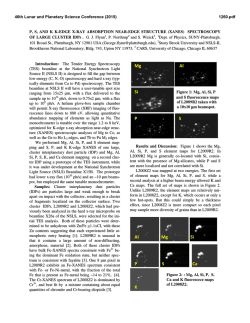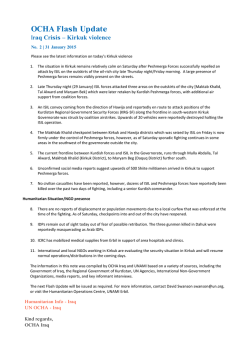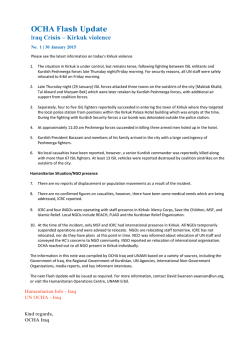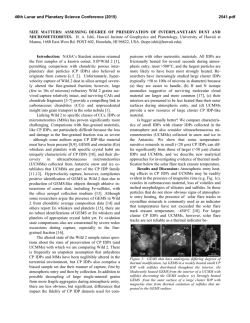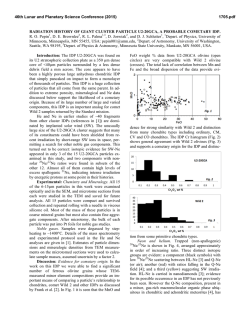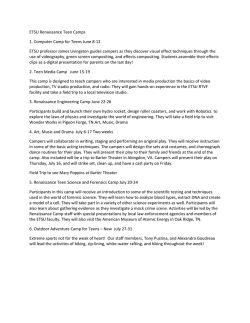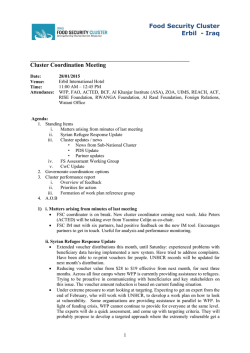
Download PDF
Iraq CRISIS Situation Report No. 29 (24 – 30 January 2015) This report is produced by OCHA Iraq in collaboration with humanitarian partners. It covers the period from 24 – 30 January 2015. Due to the rapidly changing situation it is possible that the numbers and locations listed in this report may no longer be accurate. The next report will be issued on or around 8 February 2015. Highlights Kirkuk City stable following multiple ISIL attacks Food partners regain access to Anbar Governorate for the first time since October, despite a challenging security situation Protection monitors express concern over ethnic tensions in camps Arbat IDP camp population far exceeds planned capacity, as newly displaced people continue to arrive in Sulaymaniyah The first of a series of gender and protection mainstreaming workshops for civil society members held in Erbil Map Source(s): IOM DTM 15 January 2015, Clusters, CODs. The boundaries and names shown and the designations used on this map do not imply official endorsement or acceptance by the United Nations. Map created on 1 February 2015 Situation Overview The situation in Kirkuk remains calm following heavy fighting between ISIL militants and Kurdish Peshmerga forces late Thursday night and into Friday morning. Late 29 January, ISIL forces attacked three towns on the outskirts of the oil-rich city (Maktab Khalid, Tal Alward and Maryam Bek), which were later retaken by the Peshmerga, with additional air support from coalition forces. While no civilian casualties or displacement were reported, dozens of ISIL militants and Peshmerga forces were reported killed. Since 9 January, the number of internally displaced persons (IDPs) at the Arbat Camp in Sulaymaniyah has reached over 2,700 families, with over 700 families without tents; far exceeding the camp’s planned capacity of 1,000 families. Camp staff report that as many as four families are forced to share 4x4 sq metre space inside a tent. WASH and Health clusters have raised serious concerns of disease outbreaks in the coming days. In response, the government has allocated land nearby to host the new arrivals. Site planners surveyed the land, with camp development expected in the coming weeks. Most IDPs in the camp are from Salah al-Din, followed by Anbar, Diyala and Ninewa. New IDP arrivals were provided with winterised relief items, including cooking sets, kerosene, heaters, blankets, mattresses, plastic sheeting, and jerry cans. In addition, newly-arrived children received warm clothes. Humanitarian partners are requesting immediate support with WASH facilities and supplies (hygiene kits, jerry cans), as well as digging cesspools, the installation of latrines and showers, and increased water supply. On 25 January, fighting broke out between groups of Yazidi and Muslim (Arab) IDPs at the Kabarto II IDP Camp (Dahuk). A disagreement between a Yazidi and an Arab child reportedly triggered the fighting. The parents got + For more information, see “background on the crisis” at the end of the report www.unocha.org The mission of the United Nations Office for the Coordination of Humanitarian Affairs (OCHA) is to mobilize and coordinate effective and principled humanitarian action in partnership with national and international actors. Coordination Saves Lives Iraq IDP Crisis Situation Report No. 29 |2 involved and this reportedly eventually escalated into a gunfight. The police and the special military moved in quickly to calm the situation. No serious casualties were reported except for minor injuries, but as many as 20 people were arrested. Many Arab Muslims moved out of the camp the night of 26 January in fear, but managed to return after the police intervened. Security has been hardened in and around the camp. The Kabarto II IDP camp is home to over 2,300 families (over 13,800 individuals) of mixed ethnicity. The Vice-Governor has given assurances that the authorities will take all necessary measures to prevent a re-occurrence. The potentially lessthan-peaceful co-existence is beginning to be a source of concern to humanitarian agencies in the camps because of possible revenge actions. In Baharka Camp (Erbil), the deplorable WASH situation has been raised by government and donors. It appears it will take months to install WASH in the new cabins and the extension seems to be taking a long time to open. Toilets are reportedly broken and unusable; roads to WASH facilities muddy and impassable, and people are urinating and defecating in the open. Protection monitors continue documentation and verification of an increasing number of forced eviction cases of IDPs from different communities inside Kirkuk City. Over 20 IDP families in Kirkuk from Diyala Governorate were evicted from their houses and escorted to the Kirkuk border in early January; the IDPs had been in Kirkuk since 2006. A further over 170 families were threatened with eviction in the week beginning 11 January. The Governor of Kirkuk, responding to the UN appeals, sent an official letter assuring the humanitarian community that IDPs will stay in Kirkuk as long as their areas of origin are not safe to return. According to IOM’s Displacement Tracking Matrix (DTM) released this week, 2.18 million persons have now been identified as internally displaced across Iraq, an increase of over 53,400 individuals over the last reporting period on 25 December. Of the additional over 8,900 displaced families displaced, over 5,100 were in Diyala Governorate due to the ongoing conflict. Of the total number of displaced people Iraqwide, more than 650,000 people are living in critical shelter arrangements such as informal settlements, religious buildings, schools, and unfinished buildings, the DTM (as of 15 January) reported. The largest segment of this critically sheltered population is in Dahuk (29 per cent), and in Anbar (15 per cent). Overall, across all locations, the most common A young boy at an informal settlement in Dahuk Governorate OCHA/ David Swanson critical shelter arrangement is unfinished and abandoned buildings, with over 374,400 individuals. Preliminary analysis representing 14.6 per cent of the total displaced population found that 18 per cent of the IDPs cited shelter and housing as a priority need, while 16 per cent cited NFIs as a priority need. For the first time since October, humanitarian regained access to Anbar Governorate, despite a challenging security situation. Four districts have been reached, and 31,800 displaced people were assisted with family food parcels (FFPs) since 22 January. Food partners have also regained access to the Zummar sub-district (Dahuk Governorate), previously under ISIL control. The humanitarian situation of displaced Iraqis in the southern governorates of Najaf, Kerbala and Babel has reached critical levels, following an influx of people from elsewhere in the country, according to an assessment by the United Nations World Food Programme (WFP). WFP currently assists 50,000 displaced families in Basrah, Thi Qar, Qadissiya, Missan, Wassit, Muthanna, Najaf, Kerbala, and Babel. Humanitarian Response Shelter and Non-Food items Needs: In Amiriyah, Baghdad, 1,300 IDP families from Anbar, Diyala, and Salah al-Din governorates have not yet received assistance. Approximately one-third are housed with relatives and two-thirds are living in abandoned or unfinished buildings or informal shelters. In Diyala, fighting continues to be experienced between the government forces and ISIL in Muqdadiya District with pro-government military and security groups successfully capturing several villages in the district during United Nations Office for the Coordination of Humanitarian Affairs (OCHA) Coordination Saves Lives | www.unocha.org Iraq IDP Crisis Situation Report No. 29 |3 the reporting week. As a result, IDPs continue to flee to Khanaqin. More core relief items and tents are needed for new arrivals; and an assessment will be planned accordingly. Authorities in Kirkuk and Diyala indicated a need for more camp shelter. Authorities in Kerbala report a need for more non-camp shelter options, including tents and community centres. Some 36,000 people in Tooz (Salah al-Din Governorate) need shelter support, NFIs and kerosene heaters, local authorities report. Near Fallujah (Anbar Governorate), there is a tented camp of 300 families with around 700 more families in barns and other abandoned structures. The group already has coverage with NFIs, but more information on the shelter situation for this group is needed. In Dahuk Governorate, 2,500 families living in unfinished buildings in Zakho District have been identified as being in need of winter support. Response: Kerosene update: As of 30 January, 16.5 million litres of kerosene has been distributed throughout Iraq to over 128,000 IDP families (in KR-I: 13.9 million litres to over 99,000 IDP families and in Centre and South Iraq: 2.6 million litres to over 28,800 IDP families) as of 30 January. The Government of Iraq distributed roughly half of the kerosene provided. The construction of over 1,000 concrete floors for tents and kitchens has started in the extension area of the Baharka IDP Camp (Erbil Governorate). Over 690 shelter plots are slated for completion in mid-February, with the balance (over 320 shelter plots) in mid-March. In Dahuk, at the Berseve II IDP camp, the reception centre, primary healthcare clinic and camp management offices are now completed. At the Khanke IDP camp, the camp management office is complete and a cluster partner has distributed more than 3,000 solar rechargeable light kits. In the Bajet Kandala IDP camp, the camp management office, along with 240 kitchens units have been constructed. The extension of the Garmawa camp is ongoing: over 650 out of 1,320 concrete slabs (used to raise tents off the ground and provide some wind protection) are complete. Also in Dahuk, sealing off of unfinished buildings for protection against winter elements in Sersink has been finalised. In Diyala, Cluster partners have completed the renovation project of over 70 uncompleted houses, accommodating a total of over 250 families. Gaps & Constraints: In Garmawa IDP camp (Dahuk Governorate), road access is difficult due to recent rains. Food Security Needs: Anbar Governorate: In the Heet District, IDP movement continues from Baghdadi towards Haditha and the eastern desert. Baghdadi remains in urgent need of food supplies. Humanitarian partners are also gravely concerned about the food security of thousands of people in the besieged city of Haditha, which has largely been cut off from its supply chains since October 2014. The Joint Coordination and Monitoring Centre (JCMC), has confirmed that food is a priority need. In Samara City (Salah al-Din Governorate), recently arrived IDPs from the southern part of the governorate are in urgent need of food. NGOs report a need for food assistance in Diwaniya District (Qadissiya Governorate). Response: In collaboration with its partners, Since 1 January 2015, WFP has provided support to approximately 424,000 people with family food parcels (FFPs) in 12 governorates throughout Iraq. The voucher programme is being extended. Distribution began in Dahuk City during the reporting period, targeting approximately 55,000 displaced people. To achieve a better understanding of the impact of the current conflict on the food security and livelihoods situation of host and IDP communities, a detailed assessment has been completed in Anbar Governorate. Additional assessments are underway in Baghdad, Diyala and Kirkuk. United Nations Office for the Coordination of Humanitarian Affairs (OCHA) Coordination Saves Lives | www.unocha.org Iraq IDP Crisis Situation Report No. 29 |4 Gaps & Constraints: In line with the inter-agency Strategic Response Plan, the WFP Emergency Operation in Iraq requires an additional US$200 million, to prevent a partial pipeline break for vouchers in March, and a complete pipeline break for all types of food assistance in April. Water, Sanitation and Hygiene Needs: Central and Southern Zones o Over 900 IDPs families settled in unfinished buildings and schools in Samarra District (Salah al-Din Governorate) are in urgent need of hygiene supplies for both adults and children, including bottled water and plastic garbage bags. Open defecation and urination has reportedly become the norm. o Baghdad authorities decided to establish 10 collective centres in different locations, each will host 250-500 families. Six sites were already allocated and work was started in three locations. o More than 300 IDPs families are settling on the Baghdad-Babylon road. Despite being reached by some of relief agencies, the IDPs still don’t have adequate services in terms of shelter, foods, water, sanitation and electricity. Baghdad government has decided to erect a tented camp and has asked for WASH support in establishing services. o Budgetary constraints for local governments have resulted in increased humanitarian needs amongst IDPs scattered in central and southern areas of the country and affected the ability of municipal authorities to respond effectively. Response: Central and Southern Zones: o Partners have provided 50 mobile latrines and 50 mobile showers to IDPs settled at the main road between Najaf and Kerbala through coordination with Najaf authorities and community leaders. o 2,700 IDPs were reached through ongoing garbage collection campaigns in Kut-Na'maniya road (Wassit Governorate) and Shomaly main road (Babylon Governorate). o Over 7,800 IDPs were reached through de-sludging of over 1,820 m³ of sewage in eight sites witin Najaf, Kerbala, Wassit and Babylon governorates. o Over 6,300 IDPs settled in Shanafiya, Ghammas and Saniya, were reached through provision of 1,600 sets of bottled water, sanitary pads for women and girls, diapers, plastic garbage bags and communal garbage containers. o Over 2,700 IDP families, (16,200 individuals) were provided with safe water through water trucking with a total daily amount of 420,000 litres in four locations in Anbar Governorate. Dahuk: o 103,000 people at different locations in Dahuk Governorate are provided with water through trucking on a daily basis. In addition, about 165,500 people in 15 camps are receiving wash services on daily basis (water and sanitation). o Humanitarian partners are supporting the Directorate of Municipalities for garbage collection to the final disposal site from five camps, as well as the provision of chlorine for area water supplies. This support is provided for six months. Sulaymaniyah: Water trucking rate has been increased from 126,000 to 252,000 litres per day; 12 water tanks were delivered and are being installed; over 120 prefab latrines and over 100 showers were delivered and are being installed. Gaps & Constraints: In Sulaymaniyah, new waves of IDPs have resulted in insufficient WASH facilities Lack of exact locations and figures on out-of camp IDPs in Sulaymaniyah, Khanaqin and Kirkuk. Lack of funds is preventing the Dahuk Governorate form being able to cover garbage collection from camps to the final disposal site. Also in Dahuk, the quality of construction of recently completed camps by the government and design issues is resulting in high operational and maintenance costs for WASH partners. United Nations Office for the Coordination of Humanitarian Affairs (OCHA) Coordination Saves Lives | www.unocha.org Iraq IDP Crisis Situation Report No. 29 |5 Protection Needs: Further reports from the Kirkuk Governorate indicate that local residents in the towns of Jalawla and Saadiya (Diyala Governorate) – retaken in November 2014 – have complained that Shiite militiamen had plundered their homes and shops after the fighting was over. A reported over 20 families fled conflict around Mosul Dam area to the Khazir checkpoint outside Erbil. The families were not allowed to enter Erbil and INGOs and civilians are not allowed to cross the checkpoint as Khazir is considered a conflict zone. Concern for IDPs at the Khazir checkpoint has been brought to the attention of relevant stakeholders for possible intervention. Latest figures report 710 families displaced due to recent violence around Gwer in Erbil Governorate. Families have fled to Debagah and are receiving assistance from government authorities, UN agencies and NGOs. Protection actors are concerned about the proximity of the site to insecure areas. In Erbil Governorate, child protection case management services outside of Erbil City remain an ongoing need. Similarly, in Sulaymaniyah, with an increasing number of IDP families and limited number of child protection actors, the unmet protection needs of children are significant. Children living outside camps remain hard to reach, and there are increasing reports of protection concerns such as child labour and child marriage. Adolescents can be particularly vulnerable, with limited access to education, and families’ limited access to livelihood opportunities, exacerbating these protection concerns. Response: Protection needs assessments covering close to 900,000 individuals (over 154,000 families) have been carried out since February 2014. Of these, some 22,000 have been approved for cash assistance, 53,000 have received legal assistance, and close to 21,000 persons with specific needs have been referred. Protection monitors provided winterisation kits to almost 550 IDP families scattered around Tuzkhormatu (Salah al-Din Governorate). In Diyala Governorate, protection monitors visited the new Al Yawa/Aiden IDP camp, to follow up on protection issues faced by persons of concern including issues relating to legal assistance. Medical and educational needs were identified and referrals made accordingly. The Ministry of Interior (MoI) – Baghdad has established an office in Shekhan District (Dahuk Governorate) which will handle requests for renewal/replacement of missing civil status documents (Iraqi ID Cards) for IDPs originating from Mosul. Gaps & Constraints: Threats or forced evictions could cause further displacement, increased vulnerability, exposure to harsh weather conditions and other severe protection risks, including interruption of education, loss of livelihoods and exploitation. Many families face financial problems having depleted their savings as well as the government assistance they received upon registration. Many cannot continue to pay their rent. Of over 5,400 displaced families in Erbil, over 1,500 families were assessed as being at risk of eviction. Education Needs: Of the total 2.1 million IDPs across Iraq, 615,000 are school age children between ages 6 to 17 years and an estimated 105,000 children between the ages of 4-5 years. Only 57,000 or 8 per cent of these children are currently in camps. 9,020 families or 54,120 IDPs are occupying 500 school buildings, according to the IOM/DTM, mostly in central and southern Iraq. Anbar is the most affected, with 376 schools occupied. A further 130 schools are currently occupied by military forces. Response: Over 69,000 children have access to recreational and other activities through the provision of temporary learning spaces. Over 60,360 IDP children are enrolled in schools across the KR-I. 9,980 in Dahuk, over 31,000 in Erbil and over 18,680 in Sulaymaniyah Three trainers trained in Erbil have rolled out their first set of trainings to teachers working in five schools in Dahuk city, three in Zhako and two in Sumel; subjects included psychosocial support and pedagogy. A school of 16 pre-fabricated classrooms for more than 700 children was opened at the Baharka IDP camp (Erbil Governorate). The registration process is ongoing. Also in Baharka, a new child friendly space was United Nations Office for the Coordination of Humanitarian Affairs (OCHA) Coordination Saves Lives | www.unocha.org Iraq IDP Crisis Situation Report No. 29 |6 established in three caravan classrooms to provide alternative learning and recreational activities to IDP children. The establishment of tented schools in eight camps in Dahuk Governorate is ongoing. Tents have been completed in three camps. Gaps & Constraints: Resources are needed to establish schools and educational space for those children who are at risk of dropping out of formal education, as well as expanding alternative education. Education materials such as furniture and textbooks are required for new IDP schools being established. Social Cohesion and Sustainable Livelihoods Response: A job seeker support centre has opened in Kaz Nazan (Erbil) to support non-camp refugees, IDPs and host community members to build their skills and access employment opportunities. The centre will host about 100 job seekers visitors per week with the objective of providing them with the skills and tools needed to access the labour market. The centre is also linked through a referral system for registered job seekers to other opportunities, trainings and initiatives in Erbil. A partner has been providing livelihood training to over 980 IDPs on how to find jobs and register online. Gaps & Constraints: Increased funding is needed in order to assist more IDPs in a broader range of locations. Logistics Response: A WFP logistics officer arrived on 21 January and has started the Logistic Capacity Assessment (LCA) update for Iraq. Regular Logistics Cluster Meetings to begin in Dahuk as of February 2015. General Coordination A two-day workshop entitled ‘Protection and Gender Mainstreaming in Humanitarian Action: Strengthening Response’ was held in Erbil on 26 January. This was the first initiative of its kind aimed at strengthening partnerships between civil society groups in responding to the specific needs of internally displaced women, girls, boys and men. Participants agreed on the need for better gender analysis and disaggregated data by sex and age in all sectors. Reinforcing the “whole of Iraq approach”, UN agencies and NGOs will meet for a General Coordination meeting on 5 February at 11 am at the al Rasheed Hotel in Baghdad. For further information, please contact: Abdul Haq Amiri, Head of Office, [email protected], Mobile Iraq: +964 (0) 750 312 9201 David Swanson, Public Information Officer, [email protected] Mobile Iraq: +964 (0) 750 377 0849 For more information, please visit https://iraq.humanitarianresponse.info Background on the crisis Since the fall of Mosul on 9 June 2014, armed groups (AGs), including Ba’athists, tribal militias and members of the former regime/military, along with the Islamic State of Iraq and the Levant (ISIL), have taken control of large swathes of Iraq’s provinces of Ninewa, Salah al-Din and Diyala. The cities of Mosul, Tikrit, Telafar, Beiji, Quayyara, Suleiman Bek, Heet, Rashad, Hawiga, Riyadh, Falluja and Saqlawiyah, are currently under armed group control. Since January 2014 much of Anbar has been under ISIL control. This has led to massive internal displacement. Iraq is now contending with one of the largest internally displaced populations in the world; over 2.1 million have been displaced since January last year. United Nations Office for the Coordination of Humanitarian Affairs (OCHA) Coordination Saves Lives | www.unocha.org
© Copyright 2026
